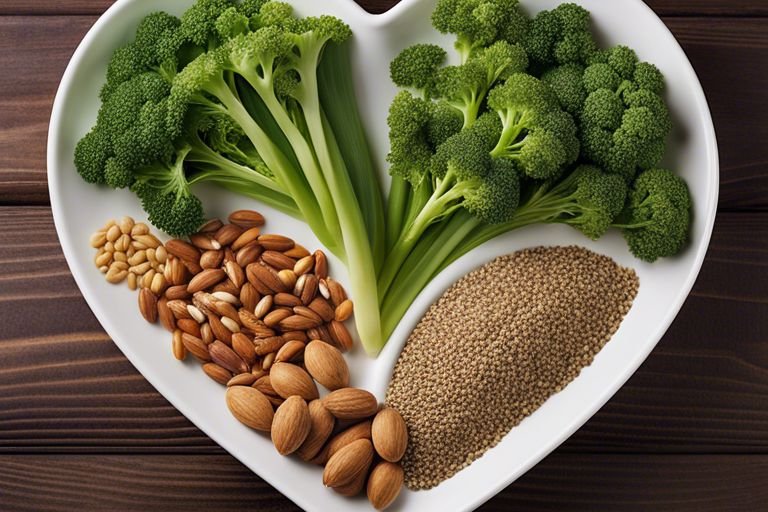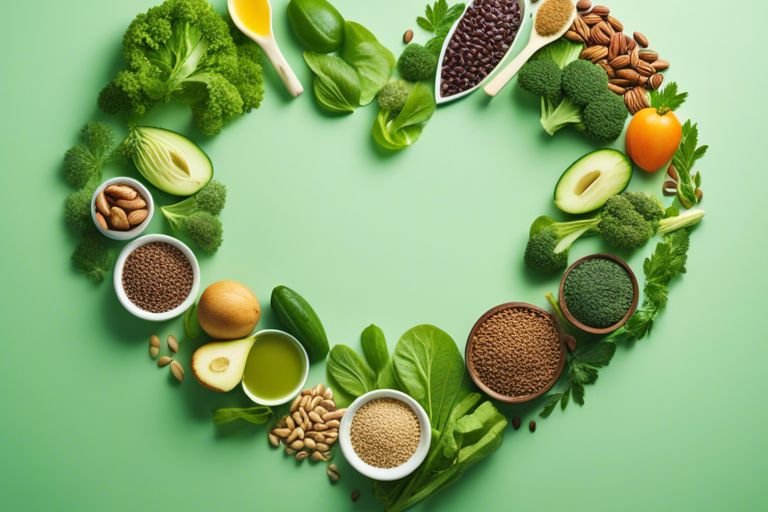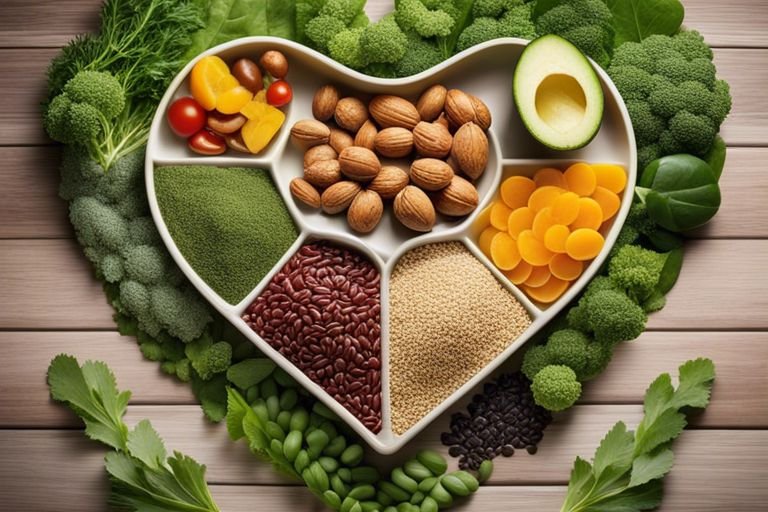With the rise in popularity of vegetarian diets, many individuals are looking for ways to ensure they are getting all important nutrients, including omega-3 fatty acids. Despite commonly being found in fish, there are plenty of plant-based sources of omega-3 that vegetarians can incorporate into their diets. In this blog post, we will explore the importance of omega-3s, their benefits, and provide you with practical tips on how to ensure you are meeting your omega-3 needs on a vegetarian diet.

Key Takeaways:
- Omega-3 Sources: Incorporate plant-based sources of omega-3 such as chia seeds, flaxseeds, walnuts, and hemp seeds into your vegetarian diet.
- Supplements: Consider taking omega-3 supplements derived from algae oil to ensure you are meeting your daily requirements.
- Balance Omega-3 and Omega-6: Maintain a balanced ratio of omega-3 to omega-6 fatty acids by reducing intake of processed foods and increasing consumption of whole foods.

Understanding Omega-3 Fatty Acids
The omega-3 fatty acids are vital nutrients that play a vital role in maintaining overall health. There are three main types of omega-3 fatty acids: ALA (alpha-linolenic acid), EPA (eicosapentaenoic acid), and DHA (docosahexaenoic acid). These fatty acids are considered vital because our bodies cannot produce them on their own, so they must be obtained through diet or supplements. ALA is mainly found in plant sources like flaxseeds, chia seeds, and walnuts, while EPA and DHA are primarily found in fatty fish like salmon, mackerel, and sardines.
Types of Omega-3 Fatty Acids
- Omega-3 fatty acids are vital for brain function and development.
- EPA and DHA are crucial for reducing inflammation in the body.
- ALA is converted into EPA and DHA in small amounts in the body.
- Getting an adequate amount of each type of omega-3 is important for optimal health.
- Supplements can be taken to ensure you are meeting your omega-3 needs.
Health Benefits of Omega-3s
An vital nutrient, omega-3 fatty acids offer a wide range of health benefits for vegetarians and non-vegetarians alike. They have been linked to reduced inflammation, improved heart health, and better brain function. Incorporating omega-3s into your vegetarian diet can help support overall well-being and may even lower the risk of chronic diseases.
Plus, omega-3 fatty acids are known to improve skin health, promote healthy weight management, and support better eye health. Including a variety of plant-based sources of omega-3s in your diet can help you reap these numerous health benefits.
Challenges of Omega-3 in Vegetarian Diets
One of the main challenges for vegetarians is incorporating enough Omega-3 fat into their diet. Since the primary sources of Omega-3 fatty acids are typically fish and seafood, vegetarians need to be mindful of their intake of crucial Omega-3 fats. For more information on Omega-3 in a vegetarian diet, you can visit here.
Common Omega-3 Sources and Their Limitations
An crucial consideration for vegetarians is the limited availability of Omega-3 sources in plant-based foods. While sources like flaxseeds, chia seeds, walnuts, and hemp seeds provide Alpha-Linolenic Acid (ALA), they may not be as efficient in converting to the long-chain fatty acids EPA and DHA, which are crucial for overall health.
Distinguishing Between ALA, EPA, and DHA
Distinguishing between ALA, EPA, and DHA is crucial for vegetarians to ensure they are meeting their Omega-3 requirements. ALA is the plant-based form of Omega-3, while EPA and DHA are predominantly found in marine sources like fish. Vegetarians can look for algae-based supplements to obtain sufficient EPA and DHA, which are vital for brain function, heart health, and inflammation regulation. Omega-3 supplementation can help bridge the gap in meeting daily recommended intake levels.
Omega-3 Rich Foods for Vegetarians
Not sure how to get enough omega-3 on a vegetarian diet? Check out The 7 Best Plant Sources of Omega-3 Fatty Acids for some great options.
Flaxseeds and Chia Seeds
One easy way for vegetarians to boost their omega-3 intake is by incorporating flaxseeds and chia seeds into their diet. These tiny seeds are packed with alpha-linolenic acid (ALA), a type of omega-3 fatty acid that supports heart and brain health.
Walnuts and Hemp Seeds
Seeds like walnuts and hemp seeds are another great source of omega-3 fatty acids for vegetarians. For instance, walnuts are rich in ALA, while hemp seeds contain a good balance of omega-3 and omega-6 fatty acids, making them a nutritious addition to salads, smoothies, or oatmeal.
Algal Oil Supplements
Vegetarians can also consider taking algal oil supplements to ensure an adequate intake of EPA and DHA, the two most important omega-3 fatty acids. It is derived from algae, making it a suitable option for those looking to avoid fish oil supplements.
Incorporating Omega-3 into Daily Meals
Breakfast Recipes
Keep your vegetarian diet rich in omega-3 by starting your day with chia seed pudding made with fortified plant-based milk or a smoothie with flaxseeds and walnuts.
Lunch and Dinner Ideas
Omega-3 can be easily incorporated into your vegetarian lunch and dinner meals by adding sources like hemp seeds, tofu, and edamame to salads, stir-fries, or buddha bowls.
It is also a good idea to include omega-3 rich sources like seaweed or algae oil in your diet to ensure you are getting a variety of vital fatty acids.
Conclusion
Summing up, incorporating omega-3 into a vegetarian diet is easily achievable by consuming plant-based sources like flaxseeds, chia seeds, walnuts, and algae supplements. These alternatives provide vital omega-3 fatty acids that are vital for overall health and well-being. By including these nutrient-rich foods in your diet, vegetarians can ensure they are meeting their omega-3 needs without compromising their dietary beliefs.
FAQ
Q: Why is Omega-3 important in a vegetarian diet?
A: Omega-3 fatty acids are necessary for brain function, heart health, reducing inflammation, and supporting overall well-being. Since the body cannot produce Omega-3 on its own, it is important for vegetarians to incorporate sources of Omega-3 into their diet.
Q: What are the best sources of Omega-3 for vegetarians?
A: The best sources of Omega-3 for vegetarians include flaxseeds, chia seeds, hemp seeds, walnuts, algae-based supplements, and certain fortified foods like plant-based milk and yogurt.
Q: How can I incorporate Omega-3 into my vegetarian diet?
A: You can incorporate Omega-3 into your vegetarian diet by adding ground flaxseeds or chia seeds to smoothies, salads, or oatmeal. Snack on walnuts or include them in your baking. Use hemp seeds as a topping for yogurt or blend them into a smoothie. Consider taking an algae-based Omega-3 supplement to ensure you are meeting your daily requirements.
